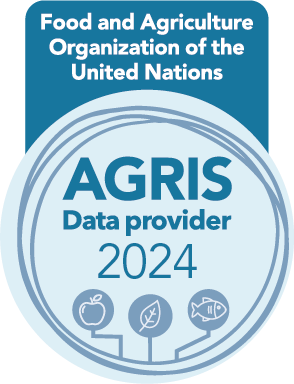Maize responds to Azotobacter sp and Burkholderia sp inoculation at reduced dose of nitrogen fertilizer
DOI:
https://doi.org/10.17268/sci.agropecu.2014.01.02Keywords:
colonization, rhizosphere effect, root absorption.Abstract
The positive maize response to inoculation with plant growth promoting bacteria (PGPB) as Azotobacter sp and Burkholderia sp an endophytic type, are an alternative to reduced and optimize nitrogen fertilizer (NF) dose, recommended for this plant, without adversely affect its growth. The aim of this study was to analyze maize respond to inoculation with Azotobacter sp and Burkholderia sp at the dose 50% of FN. Used an experimental design of randomized blocks. By response variables: percent germination (%), the shoot and root phenology: plant height (PH), root length (RL) and biomass: shoot fresh weight (SFW) and root fresh weight (RFW), the shoot dry weight (SDW) and root dry weight (RDW). The results indicated a positive maize respond to PGPB inoculation at germination, seedling and flowering level, reached a RDW of 7.03 g, statistically significant value compared with 2.60 g of RDW non inoculated maize feed with NF dose recommended regard as relative control (RC). This suggests a synergistic interaction among these PGPB in synthesis of plant growth promoting substances (PGPS) on maize, to optimize the reduced NF dose.
References
Aguirre-Medina, J.F.; Irizar, G.M.B.; Duran, P.A.; Grageda, C.O.A.; Peña Del Rio, M.A.; Loredo, O.C.I.; Gutierrez, B.A. 2009. Los bofertilizantes microbianos alternativa para la agricultura en México, INIFAP-SAGARPA Folleto Técnico No 5. Tuxtla, Chiapas, México.
Arellano, Y.; García, E.; Vázquez-Ramos, J.M. 2008. Auxin-stimulation of DNA synthesis and cell cycle proteins during maize germination. Agrociencia 42: 637-644.
Armenta, A.D.; García, C.; Camacho, J.R.; Apodaca, M.A.; Montoya, L.G.; Nava, E. 2010. Biofertilizantes en el desarrollo agrícola de México. Revista Sociedad, Cultura y Desarrollo Sustentable 6: 51-56.
Camelo, M.; Vera, S.P.; Bonilla, R.R. 2011. Mecanismos de acción de las rizobacterias promotoras del crecimiento vegetal. Revista Ciencia y Tecnología Agropecuaria 12: 159-166.
Escobar, C.; Horna, Y.; Carreño, C.; Mendoza, G. 2011. Caracterización de cepas nativas de Azotobacter spp. y su efecto en el desarrollo de Lycopersicon esculentum Mill. “Tomate” en Lambayeque. Scientia Agropecuaria 2: 39-49.
García-Reyna, M.J.; Plata, G.D.; Cárdenas, N.R.; Farias, R.R.; Sánchez-Yáñez, J.M. 2001. Isolation and effect of inoculation of maize with endophytic bacteria of teocintle. Meeting III on Rhizosphere, Dijon, France.
García-Reyna, M.J.; Caballero, M.J., Cárdenas, N.R.; Farías, R.R; Sánchez-Yáñez, J.M. 2000. Aislamiento y densidad de bacterias endofitas de teocintle. XXV. Congreso Nacional de Microbiología, Mérida, Yucatán, México.
García-González, M.M.; Farías-Rodríguez, R.; Peña-Cabriales, J.J.; Sánchez-Yáñez, J.M. 2005. Inoculación del trigo var. Pavón con Azospirillum spp. y Azotobacter beijerinckii. Terra 23: 65-72.
García, J.A.; Castillo, A.; Ramírez, M.E.; Rendón, G.; Larqué, M.U. 2001. Comparación de los procedimientos de Tukey, Duncan, Dunnett, HSU y Bechhofer para selección de medias. Agrociencia 35: 79-86.
Hernández-Rodríguez, A.; Heydrich-Pérez, M.; Diallo, B.; Jaziri, M.E.; Vandeputte, O.M. 2010. Cell-free culture medium of Burkholderia cepacia improves seed germination and seedling growth in maize (Zea mays) and rice (Oryza sativa). Plant Growth Regulation 60: 191–197.
Martínez, E.; Beltrán, E.; López, J. 2011. La arquitectura radicular del maíz (Zea mays L). Ciencia Nicolaita 53: 48-60.
Mora, E.; Toro, M. 2007. Estimulación del crecimiento vegetal por Burkholderia cepacia, una cepa nativa de suelos ácidos de sabanas venezolanas. Revista Agronomía Tropical 57: 123-128.
Piromyou, P.; Buranabanyat, B.; Tantasawat, P.; Tittabutr, P.; Boonkerd, N.; Teaumroong, N. 2011. Effect of plant growth promoting rhizobacteria (PGPR) inoculation on microbial community structure in rhizosphere of forage corn cultivated in Thailand. European Journal of Soil Biology 47: 44-54.
Reyes, I.; Valery, A. 2007. Efecto de la fertilidad del suelo sobre la microbiota y la promoción del crecimiento del maíz (Zea mays L.) con Azotobacter spp. Bioagro 19: 117-126.
Sánchez-Yáñez, J.M. 2007. Breve Tratado de Microbiología Agrícola Teoría y Práctica. COSUSTENTA, SA de CV, CIDEM, Instituto de Investigaciones Químico Biológicas/Universidad Michoacana San Nicolás de Hidalgo, ISBN 978-970-95424-1-7, Morelia, Mich. México. pp. 130-133, 136-138, 153-155.
Wong-Villareal, A.; Caballero-Mellado, J. 2010. Rapid identification of nitrogen fixing and legume noduling Burkholderia species based on PCR 16S RNA species-specific oligonucleotides. Systematic and Applied Microbiology 33: 35-43.
* Autor para correspondencia.
E-mail: syanez@umich.mx (J. Sánchez-Yáñez).
Recibido 17 noviembre 2013.
Aceptado 18 marzo 2014.
Published
How to Cite
Issue
Section
License
The authors who publish in this journal accept the following conditions:
a. The authors retain the copyright and assign to the magazine the right of the first publication, with the work registered with the Creative Commons attribution license, which allows third parties to use the published information whenever they mention the authorship of the work and the First publication in this journal.
b. Authors may make other independent and additional contractual arrangements for non-exclusive distribution of the version of the article published in this journal (eg, include it in an institutional repository or publish it in a book) as long as it clearly indicates that the work Was first published in this journal.
c. Authors are encouraged to publish their work on the Internet (for example, on institutional or personal pages) before and during the review and publication process, as it can lead to productive exchanges and a greater and faster dissemination of work Published (see The Effect of Open Access).




